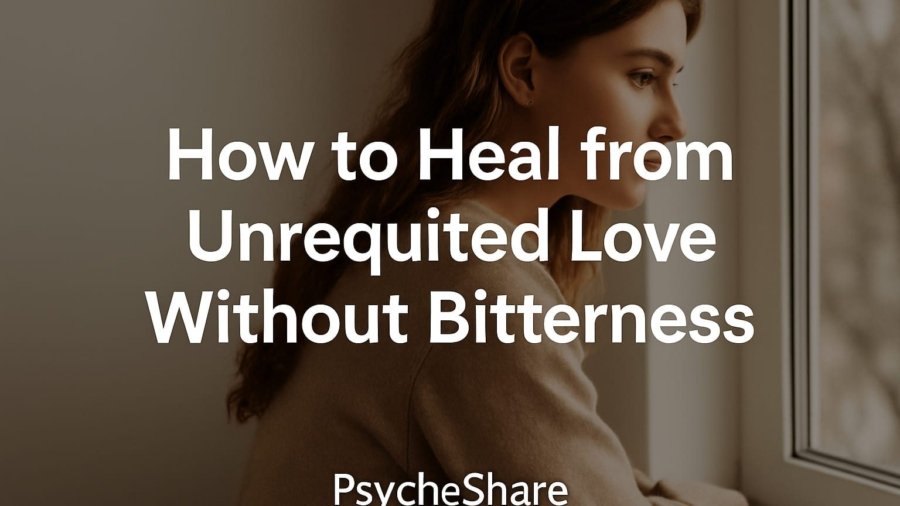Unrequited love is one of the quietest forms of heartbreak. You grieve a relationship that that never even existed or only existed at your end and more often than not you carry that grief alone.
No shared closure. No mutual sadness. And you are wondering why the love you gave was not returned.
If you have ever loved someone with all your heart and the person never reciprocated that love, you already know the pain. The pain is genuine. But recovery is an option. And it starts with compassion for yourself. Healing from unrequited love is a journey and you can start by taking a first step.
Understanding the Emotional Burden of Unrequited Love
Unlike a breakup, where at least both parties are aware of the relationship, unrequited love carries a unique kind of invisibility. Your feelings exist, but the other party is not necessarily aware even if they are aware, they might not be feeling the same way about you, so they do not reciprocate your, love, tome or attention.
This creates emotional dissonance. You feel rejected, hurt, unseen, and sometimes even ashamed. Unresolved emotional pain especially rejection can trigger the same brain regions as physical pain, reinforcing how real and valid your heartbreak is.
Forms of Unrequited Love
Unrequited love does not always look like a dramatic confession or a romantic chase. Sometimes it is subtle, quiet, and long-lasting. These are the most common forms:
- Romantic love not returned: You fall for someone who simply does not feel the same.
- Love for a friend: You develop deeper feelings, but they only see you as a friend.
- Love for an ex: The relationship has ended, but you still hope for reconciliation.
- Love for someone unavailable: They are already in a relationship or emotionally closed off.
- Idealised or imagined love: You are drawn to a version of someone you created in your mind, not the real person.
Signs of Unrequited Love

Unrequited love is not always obvious at first. You may feel confused, hopeful, or even question your own instincts. Recognising the signs early can help you protect your emotional well-being. Some common signs include:
- You initiate most of the contact: You are always the one texting, calling, or making plans.
- They are emotionally unavailable: They avoid deeper conversations or seem disinterested in your life.
- Your feelings are dismissed or ignored: When you express care or vulnerability, they brush it off.
- There are mixed signals: One day they are warm, the next day distant with no explanation.
- You feel anxious around them: Instead of feeling safe or seen, you often feel insecure and unsure.
- They talk about liking or dating others: Even when they know how you feel, they make it clear they are not interested.
Why Bitterness Often Follows and Why It Does Not Have To
Bitterness is a defense. When we feel hurt yet powerless, we often try to protect ourselves through anger, resentment, or shutting down emotionally. However, clinging to bitterness only prolongs the pain.
Healing from unrequited love requires a conscious decision to feel the hurt but not become it. Research from the National Institutes of Health has shown that individuals who shift attention through humour or cognitive reframing experience significantly better emotional outcomes.
1. Acknowledge Your Emotions Without Shame
You are allowed to feel disappointed. You are allowed to feel rejected. And you are allowed to grieve, even if the love was one-sided. But in all, accept the pain and do not dismiss it.
Emotional approach coping such as writing about how you feel or saying it out loud has been shown to improve short- and long-term mental health. Naming and expressing your feelings lessen their severity.

2. Stop Romanticising the “What If”
One of the hardest parts of unrequited love is letting go of the imagined future. The idea of the relationship that was in your mind might have been safe, ideal, or richly fulfilling. Yet it was still an illusion. Try and look at the whole picture in front of you and not that ideal picture that might never come to reality.
No matter how much you wish you could, you cannot control how another person feels about you. Just because someone fails to see your worth does not make them a bad person neither does it make you an unlovable person. That relationship is just not meant for you.
In How to Stop Comparing Yourself to Others, Building Self-Worth, we explore how comparison especially to imagined realities distorts our self-perception. Letting go of the “what if” enables you to return to what is real and what is true: your own life, your own worth, and your own healing journey.

3. Reclaim Your Narrative with Self-Compassion
You were not foolish for loving. You were human. And you have the capacity to love whether returned or not. This is a great testament to your depth.
As shared in Why Forgiving Yourself Is Hard, being nice to oneself is required in recovery from emotional pain. Always remind yourself that you did the best you could just to be seen, heard and loved and hope you had more. That alone deserves kindness, not criticism.
Forgive yourself for loving the wrong people and also not knowing sooner.
Forgive yourself for staying too long in places you were not meant to be and never felt appreciated at.
Do not be your own punishment be your own Grace when healing from unrequited love.
4. Create Boundaries That Protect Your Peace
If you still see or interact with the person you had feelings for, it may be time to set some healthy boundaries. This is not about punishing them, it is about protecting you.
- Reduce social media exposure to their content
- Limit emotional conversations that reignite false hope
- Create physical or emotional distance if needed
Boundaries are not walls. They are doors. You get to decide who comes through and how close they get to your heart. According to Verywell Mind, creating emotional space through mindfulness and reframing helps to reduce intrusive thoughts and build resilience.
You might find our post How to Set Healthy Boundaries with Family and Friends especially helpful. It explains how to define your comfort zones, communicate your needs clearly, and maintain consistent enforcement all without guilt or resentment.
5. Channel the Energy into Self-Growth
Love does not have to lead to a relationship, but it can lead to change. Use this chapter of your life to build something meaningful: a new hobby, friendship, project, or goal.
The more you grow into your true self, the less you rely on others for emotional validation. If you don’t receive the love, you want from another, channel that energy and love to yourself. Begin to love yourself the same way you wished someone will love you.

6. Never Assume A Relationship with Anyone
The fact that someone is very close to you, checks up on you daily and always there for you does not mean he or she is in love with you.
Let the them communicate their intentions clearly to you. Do not just assume they love you or else you will be in love with someone that is just helping you just from the kindness of heart.
Choose Wholeness Over Bitterness
Healing from unrequited love is not about forcing yourself to forget. It is about learning to remember without pain. To honor what you felt, even if it was not mutual. To bless the love, even if it never blossomed. And to walk away not with bitterness, but with dignity.
Because in the end, your ability to love is strength, not weakness even when it was not returned. Let that be the foundation of your healing.



Add a Comment